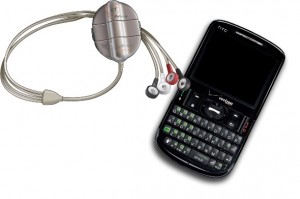 The ACT device paired with a previous phone.
The ACT device paired with a previous phone.
LifeWatch, a Swiss remote cardiac monitoring company that has been connecting to mobile phones since 2009, has received FDA clearance for a new version of its Ambulatory Cardiac Telemetry (ACT) system that will run on Android devices. Currently, the system runs on Microsoft Windows phones. Patients use the mobile software to answer a couple questions related to symptoms and, if they want, to capture and send manual readings off for analysis.
The initial clearance will allow the system to work with the Samsung Galaxy S4 Mini, but according to a press release the company plans to get clearance for additional Android phones in the future, as well as for a planned Android-compatible cardiac telemetry patch and another product under development, the company's "universal gateway" which also will run on an Android operating system.
In addition to setting the company up for its future plans, the new clearance should also present a cost-savings for customers because Android phones are cheaper than the Windows phones LifeWatch uses now.
LifeWatch has been in the mobile cardiac telemetry field since 1993, but it launched a mobile phone-compatible version of ACT in 2009, in partnership with Verizon.
ACT is a 3-channel ECG system that can auto-detect atrial fibrillation, tachycardia, bradycardia and pause, according to LifeWatch's website. It can also be used for up to 30 days and provides an increased diagnostic yield over standard event and Holter monitors.
LifeWatch picked up its last FDA clearance in December, for its Vital Signs Patch (VSP), the company’s adhesive patch for remote patient monitoring. The device is a disposable adhesive strip which contains sensors to monitor ECG, heart rate, respiration rate, temperature, saturation, and movement. It also contains a battery which allows the device to collect data continuously for five to seven days. The clearance is for the whole VSP system, which also includes a wireless connected blood pressure cuff and, notably, an Android app that processes and transmits the data. The app can also monitor the patient and generate alerts in the event of unusual vital signs.
LifeWatch is no stranger to the Android operating system: it unveiled a health-focused smartphone running on the OS way back in 2012. The LifeWatch V never made it to market, however, and the project's dedicated website is no longer online. The vision for the smartphone was that it would offer a range medical sensing capabilities, including: EKG, heart rate, SpO2, body fat percentage, temperature, and glucose.














